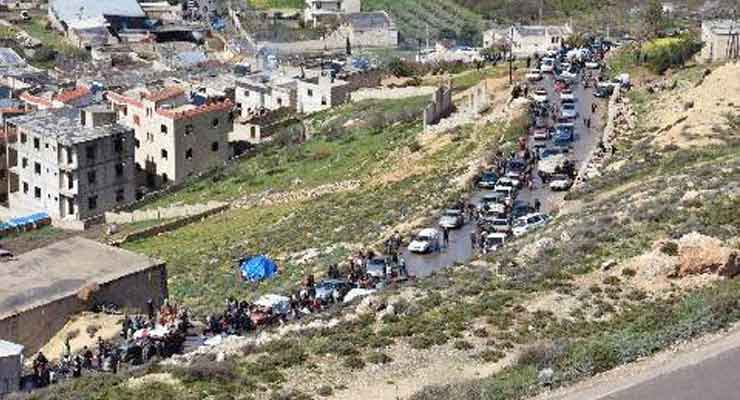 Last week, German Chancellor Angela Merkel called the Turkish offensive in the Syrian enclave “unacceptable.” But that has not stopped her government from selling arms to Turkey, German public media reported.
Last week, German Chancellor Angela Merkel called the Turkish offensive in the Syrian enclave “unacceptable.” But that has not stopped her government from selling arms to Turkey, German public media reported.
Germany continues to authorize the export of weapons to Turkey despite criticizing the country’s offensive in the Syrian enclave of Afrin, German public broadcaster ARD reported Thursday.
The German government has approved the export of military equipment worth €4.4 million ($5.4 million) since January 20, when Turkey launched its offensive against Kurdish militia in Afrin, ARD said, citing a response from the Foreign Ministry to a question by the Left party.
The value of the approvals in the month preceding the offensive was almost €10 million.
Merkel’s credibility in question’
Left party lawmaker Sevim Dagdelen, who has been a prominent critic of German arms exports to Turkey in the past, said the recent approvals had raised questions about Chancellor Angela Merkel’s credibility after she denounced the invasion as “unacceptable.”
“The criticism does not have any consequences,” he told ARD, adding that rather than taking action to stop the fighting, Merkel’s government authorized more weapons sales.
Last week, Merkel criticized Turkey’s attack on Kurdish forces in Afrin, which Ankara describes as an anti-terror offensive.
“Despite all justified security interests of Turkey, it’s unacceptable what’s happening in Afrin, where thousands and thousands of civilians are being pursued, are dying or have to flee,” Merkel told German lawmakers.
German arms in Afrin?
Social Democrat (SPD) Deputy Parliamentary Leader Rolf Mützenich said one could not rule out that Turkey would use some of the weapons bought from Germany in the ongoing offensive in Syria.
“NATO countries like Turkey have more open delivery options, but they can also be denied, and in this case, that would be appropriate,” he told the German broadcaster.
Turkey says it has taken “complete control” of Afrin after a ground and air offensive against the YPG that controlled the Syrian enclave. Ankara considers the YPG a terror group and an extension of the banned Kurdistan Workers’ Party (PKK) rebels, which is waging an insurgency within its own borders.

 Syrian Kurdish People’s Protection Units (YPG) handed over the city center without engaging in urban warfare against the Turkey-led Free Syrian Army (FSA) forces Because the United States pull the rug underneath of the Kurds.
Syrian Kurdish People’s Protection Units (YPG) handed over the city center without engaging in urban warfare against the Turkey-led Free Syrian Army (FSA) forces Because the United States pull the rug underneath of the Kurds.
 CAIRO – 19 March 2018: Egypt on Monday condemned Turkey’s “occupation” of northern Syria’s city of Afrin and the human rights violations carried out by Turkish troops in the city.
CAIRO – 19 March 2018: Egypt on Monday condemned Turkey’s “occupation” of northern Syria’s city of Afrin and the human rights violations carried out by Turkish troops in the city. Beirut, March 16, 2018 (AFP) – Sixteen civilians were killed on Friday in a Turkish airstrike that hit the main hospital in the Kurdish city of Afrine in northwestern Syria, the Syrian Observatory said. human rights (OSDH).
Beirut, March 16, 2018 (AFP) – Sixteen civilians were killed on Friday in a Turkish airstrike that hit the main hospital in the Kurdish city of Afrine in northwestern Syria, the Syrian Observatory said. human rights (OSDH). Following an official statement by Turkish president Recep Tayyip Erdogan’s spokesperson saying that Ankara is willing to cooperate with Washington in Syria to create a shared security zone around the city of Manbij (currently held by US-backed forces), additional commentary was made regarding Turkey’s intentions for Afrin, Al-Masdar News reports.
Following an official statement by Turkish president Recep Tayyip Erdogan’s spokesperson saying that Ankara is willing to cooperate with Washington in Syria to create a shared security zone around the city of Manbij (currently held by US-backed forces), additional commentary was made regarding Turkey’s intentions for Afrin, Al-Masdar News reports. Ankara says 41 of its soldiers have been killed in Syria’s northwestern region of Afrin, where the Turkish military has been engaged in a ground operation against US-backed Kurdish militants for more than a month.
Ankara says 41 of its soldiers have been killed in Syria’s northwestern region of Afrin, where the Turkish military has been engaged in a ground operation against US-backed Kurdish militants for more than a month. YPG representative in Afrin Brusk Haseke told Sputnik that the Syrian government forces have entered Afrin besieged by the Turkish military. The Syrian armed forces, however, yet to confirm this information.
YPG representative in Afrin Brusk Haseke told Sputnik that the Syrian government forces have entered Afrin besieged by the Turkish military. The Syrian armed forces, however, yet to confirm this information. Turkish leader Recep Tayyip Erdogan has pledged Turkey’s forces would lay siege to the Kurdish-controlled Afrin “in the coming days.” Previously, Kurds denied reports of a deal with Damascus to fight the Turks together.
Turkish leader Recep Tayyip Erdogan has pledged Turkey’s forces would lay siege to the Kurdish-controlled Afrin “in the coming days.” Previously, Kurds denied reports of a deal with Damascus to fight the Turks together.